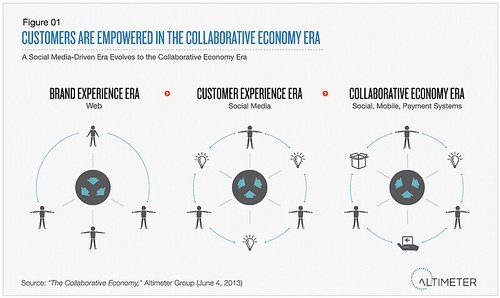Thanks to you, last week’s Report on the Collaborative Economy was readily received, and has been viewed over 26,000 times. The media and bloggers alike have picked up on it. As we digest what it means, it’s important to recognize that this is the next phase of the internet and the next phase of social business. An interesting finding is that the second era (social) and the third era (Collaborative Economy) use the same social technologies but, instead of sharing media and ideas, people are sharing goods and services. This is all part of a continuum. We need to understand how our careers will progress as the market moves forward with us.
[Social technology enabled the sharing of media and ideas called social business –The same tools enable sharing of goods and services called the collaborative economy]

| Attribute | Brand Experience Era | Customer Experience Era | Collaborative Economy Era |
| Driving technology | CMS and HTML | Social technologies | Social technologies |
| Years | 1995: Internet had 14% American adoption | 2005: Business blogging disrupted corporations | 2013: AirBnb, TaskRabbit, Lyft, gain mainstream attention |
| What is shared | Vetted Information | Personal Ideas and Media | Goods and Services |
| Who shares | Few | Many | Many |
| Who receives | Many | Many | Many |
| What it looks like | Brands and media talk, people listen | Everyone talks and listens | Buy once, share many, need to buy less |
| Who has the power | Brands and publishers | Those who use social | Those who share goods and services |
| Who is disrupted | Traditional mediums: TV, Print | Corporations, governments | Corporations, governments |
| What must change | Media models | Communication and marketing strategy | Business models |
| How corporations responded | Created their own corporate website | Adopted social tools internally, externally | Learn to share products, enable marketplace |
| Software needed | CMS and design tools | SMMS, monitoring, communities | Marketplace, ecommerce, communities, SMMS, Monitoring |
| Services needed | User Experience, Design, Content | Social strategy, community managers, communicators | Agencies that help with trust, customer advocates, ? |
| Who wins | Those who adopt | Those who adopt | Those who adopt |
What it means to your career, clients, and company:
Change in our careers is good. It leads to new opportunities, growth, and even fun. It often requires us to step out of our comfort zones and be prepared to adopt new paradigms. With that said, here are three insights to remember as we enter into this next phase.
- Prepare for the next phase in your career as we shift eras. The internet continues to evolve and, with, that our careers do as well. The mid 90s saw the blistering heat of the “dot bomb” era. As the internet became a dominant force, it subsided with the global recession and industry implosion until we saw the second phase emerge. We dubbed it “Web 2,” where information creation and consumption was democratized by all. The next phase uses the same principals of sharing and democratization, but involves goods and services.
- Take what you’ve learned in social business and apply it to the Collaborative Economy. If you’re in social business, you’re in a good spot. The same rules apply about letting go of control, shifting to engage, and connecting with customers. Learning to listen for understanding, engaging with customers, developing programs where customers become your advocates, and applying scalability, all topics I’ve researched deeply, will apply to this next phase.
- Change is in inevitable. Prepare for this next phase now. The next phase has already begun. Last week’s LeWeb received international acclaim, and funding to sharing startups is on rise. Even cities like Amsterdam are opening up to the potential of companies like AirBnb. Mainstream media is covering this movement. We must prepare for the next phases of our careers now. We can and will do this together.
I hope this graphic and matrix help to clearly articulate our next phase. Save it, share it and activate on it now. If you’d like to join me on a webinar to learn more and ask questions, you can register on this page.
Remember, those who adapt, win.
Comments are closed.